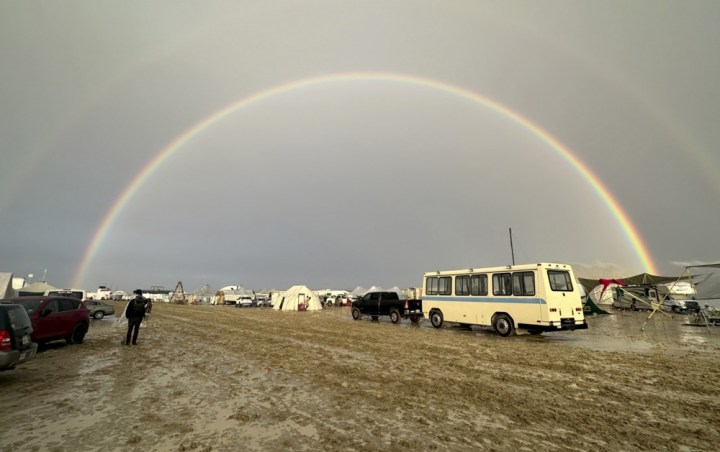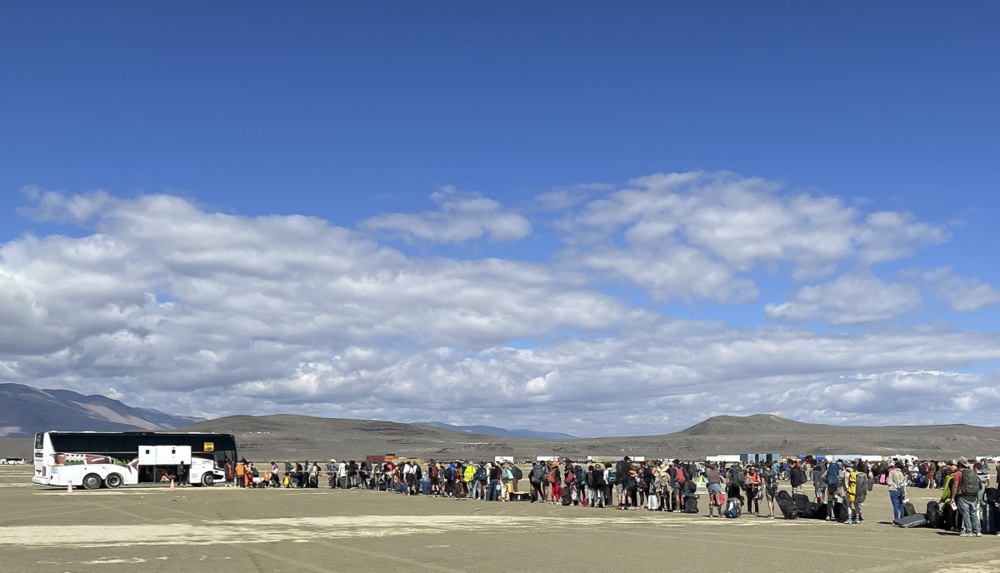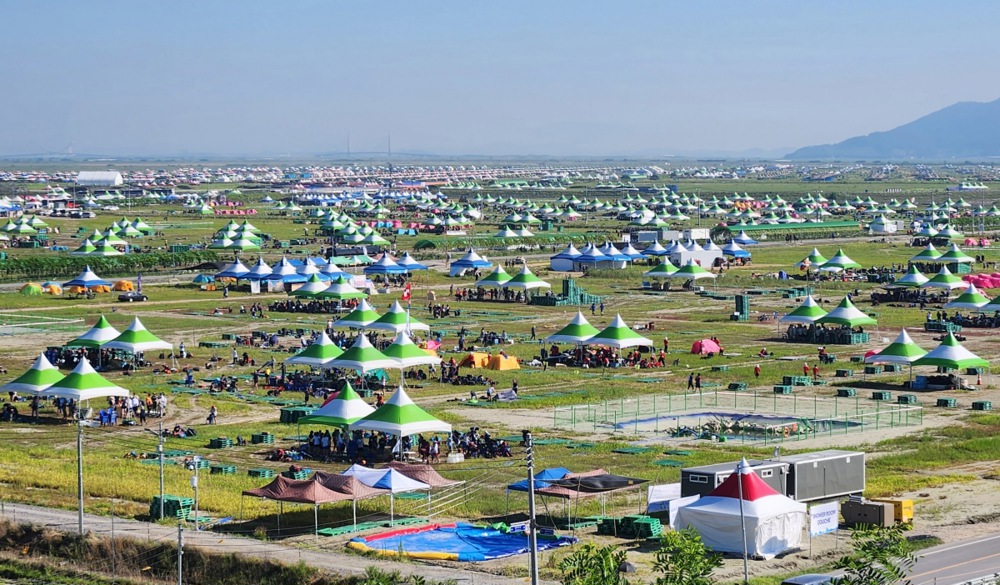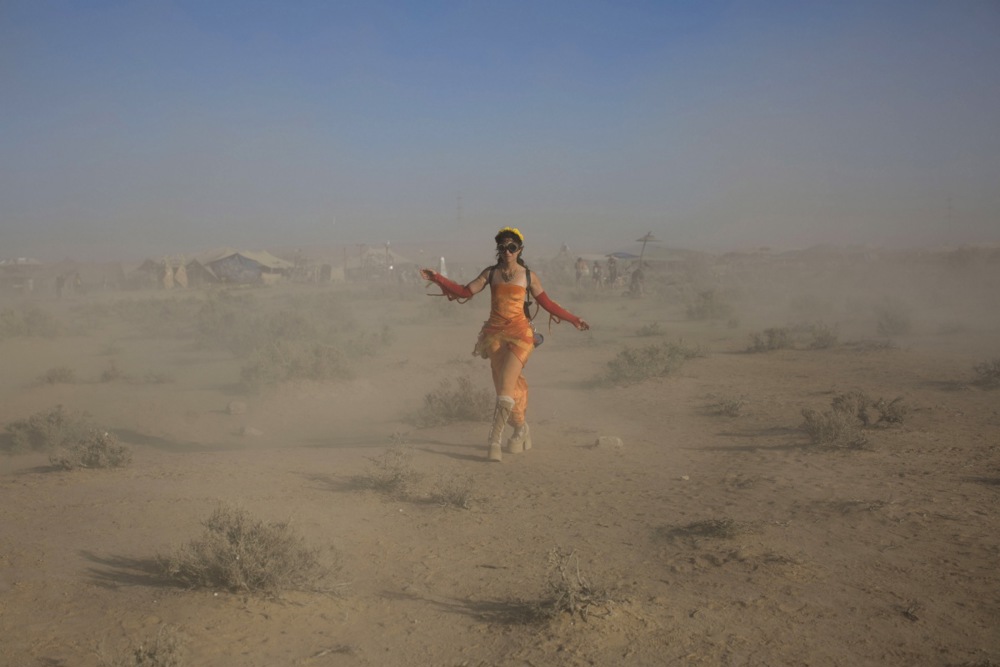THE CONVERSATION
Rain on my parade – why outdoor festivals like Burning Man are reeling from extreme weather

Burning Man turned to mud. Korea’s Scout Jamboree ended in heat, a typhoon, evacuations and recriminations. Extreme weather threatens your favourite festival.
Climate activists lined the road to this year’s Burning Man festival in Nevada to call out the “privileged mindset” of the Silicon Valley types who flock there – and the waste involved in creating a temporary city in the desert.
Only a couple of days later, disaster struck. Unprecedented rain – 20mm in 24 hours – turned the desert into mud, trapping the 70,000 festival-goers.
As you might expect, the internet went wild with schadenfreude. But there’s a deeper issue here. This is not the first – and won’t be the last – outdoor festival upended by unprecedented weather. It was only a month ago when the World Scout Jamboree in South Korea was crippled by intense heat and typhoons, forcing its abandonment. Last year’s Splendour in the Grass festival in northern New South Wales turned into a mud pit after unprecedented rains.
Outdoor festivals are a summer rite of passage for many. Warm weather makes them possible. But summer’s when we often see the wildest weather too. As climate change loads the dice, we’ll see more festival disruptions, more often.

People wait in line for a bus to leave the Burning Man festival in Black Rock Desert, Nevada, USA, 04 September 2023 (issued 05 September 2023). Heavy rains in the normal dry location created deep, heavy mud conditions that made much of the area impassible, stranding as many as 70,000 people and forcing Burning Man Festival organizers to shut down the road leading into and out of the entrance to the festival. EPA-EFE/JAMES MULHOLLAND

Last month, the world’s scouting jamboree was hit by heatwaves and a typhoon. EPA-EFE/YONHAP
Summer may no longer be the right time for festivals
The biggest music festivals are usually held in the summer months: Glastonbury in the United Kingdom and Tomorrowland in Belgium are held in the northern hemisphere summer, in late June and late July respectively. America’s Coachella festival takes place in April, but it’s in a desert where daytime temperatures over 30℃ are the norm.
As the world heats up, summer may soon be too risky for festival organisers. Creating large festivals is expensive and logistically challenging; wipeouts from extreme weather events pose major financial risks.
When we go to festivals, we leave behind our houses and easy access to water. Many people camp in tents with relatively little protection from the elements. During heatwaves, it’s particularly important to stay out of the heat and sun in the middle of the day and to stay hydrated. This isn’t always possible at festivals. Many of us underestimate the effect of heat on our bodies.
Extreme rainfall is very challenging for organisers. Managing tens of thousands of muddy, stuck people is hard – especially if it’s too difficult to bring supplies in. That’s why Burning Man organisers had to call on their attendees to conserve food and water.
If you have tens or even hundreds of thousands of people exposed to the heatwave or rainfall, it can pose a risk to their health. Evacuating large numbers of people is logistically very challenging. As the climate changes, we can expect more frequent and more severe extreme weather. This will make the job of festival organiser much harder.
Organisation matters
It’s too bad that #BurningMan did not consult an ephemeral lake geologist to learn proactively what happens when it rains on a dry lake bed in the desert. The scars left by people on this ecosystem will last for a long time.
— Kathy Benison (@KathyBenison) September 3, 2023
Well-organised festivals are much safer. If organisers think ahead and put contingency plans and adequate infrastructure in place, the chaos from extreme weather events can be much better managed. For instance, during the trouble-stricken Scout Jamboree in Korea, there were real concerns over the intense heat, given children are more vulnerable.
But the heat shouldn’t have been a surprise. The event was held at the height of summer – albeit in a year of record-breaking heat. So organisers should have anticipated heat and put in place better strategies to manage extreme weather. A simpler solution might have been avoiding the middle of summer.

A festival-goer walks in desert dust during the Israel Midburn Festival in the Negev desert southern Israel, 31 May 2017. Hosting a festival in the desert isn’t easy at the best of times – let alone as extreme weather intensifies. EPA/ABIR SULTAN
What are we likely to see in the future?
Extreme weather hitting festivals isn’t new. The legendary 1969 Woodstock festival in New York State was also a mud pit. What is new is the increased frequency and intensity of these events. Climate scientists have warned of these effects for decades. Now they’re arriving.
As we heat the planet, we’re getting more frequent, intense and longer-lasting heatwaves across the world. We also know we’re seeing more and more intense short-duration downpours which cause flash flooding. It stands to reason we can expect to see more upheaval and health concerns at outdoor festivals.
What can be done? Expect to see festival dates move to shoulder seasons rather than midsummer. Some locations may no longer be viable. Last year’s Burning Man sweltered, with temperatures of 40℃. If festival organisers don’t want to move the date or location, the minimum response they’ll need is to actively plan to manage extreme weather and ensure key infrastructure like water and toilets can cope with heat or floods.
If the world keeps pumping out greenhouse gas emissions at high rates, we could see some summer festival locations get much hotter – rising 4℃–8℃. That’s because land areas in summer are expected to heat up quicker than the global average. Those higher temperatures would make it impossible to safely host a festival. DM![]()
This story was first published on The Conversation.
Andrew King is a Senior Lecturer in Climate Science at the University of Melbourne.





















What utter nonsense, outdoor events have been hit with severe weather events numerous times. You think the muddy quagmire that was Woodstock was any different? This sensationalist nonsense is quite sad